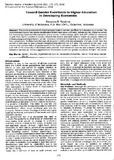| dc.contributor.author | Temtime, ZT | |
| dc.date.accessioned | 2008-08-04T10:38:15Z | |
| dc.date.available | 2008-08-04T10:38:15Z | |
| dc.date.issued | 2002 | |
| dc.identifier.citation | Temtime, ZT (2002) Toward gender excellence in higher education in developing economies / Pakistan Journal of Applied Sciences, Vol 2, No 2, pp 170-175 | en |
| dc.identifier.issn | 1607-8926 | |
| dc.identifier.uri | http://hdl.handle.net/10311/184 | |
| dc.description.abstract | The social and economic disadvantages faced by women, particularly in developing countries, has long promoted inquiry into gender stratification in the major socio-economic infrastructures. Higher education has increasingly become instrumental in giving women the knowledge, skills and self-confidence necessary to gain their rightful position in society. Despite the serious attempts made by higher education institutions in formulating and implementing gender conscious policies and programs, the participation of women is far from satisfactory. Furthermore, the pace of progress in attitudinal and behavioural changes in both men and women is very slow as socio-culturally instigated impediments are still alive. The purpose of this paper is to examine the current status of gender equality in the higher education system of Botswana. Data on students and staff on the University of Botswana were collected from secondary sources and analysed using simple tabulation techniques. Some suggestions are forwarded to achieve gender excellence in high education. | en |
| dc.language.iso | en | en |
| dc.publisher | Science Publications / ANSI Journals; http://www.ansijournals.com/3/c4p.php?id=1&theme=3&jid=jas | en |
| dc.subject | Gender | en |
| dc.subject | Women | en |
| dc.subject | Organisational culture | en |
| dc.subject | Developing economies | en |
| dc.subject | Gender excellence | en |
| dc.subject | Gender equity | en |
| dc.title | Toward gender excellence in higher education in developing economies | en |
| dc.type | Article | en |

